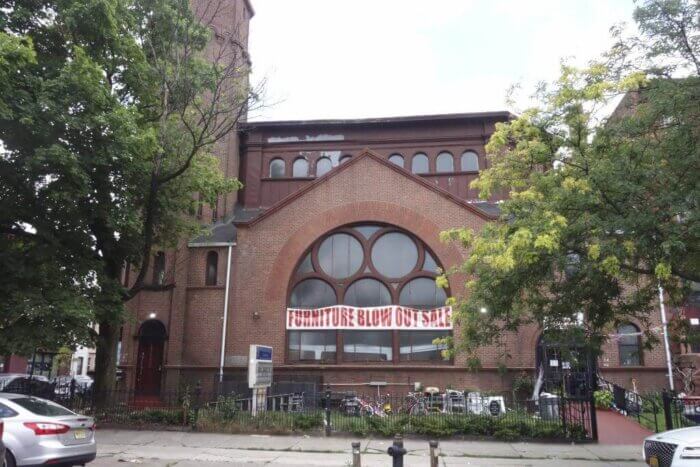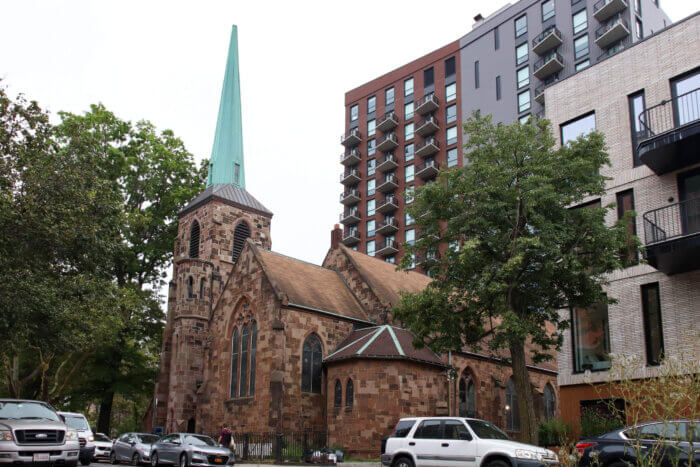The city has placed a full vacate order on the large 1890s Romanesque Revival church on the corner of Bushwick Avenue and Cornelia Street in Bushwick due to its crumbling roof and other conditions, shutting down a thrift store that had been operating inside and throwing the building’s future into question.
According to the July order, the ceiling is in danger of collapsing in multiple places, walls are water damaged, and a stairwell is rotted, among other issues. The church, currently owned by Restoration Worship Temple, Inc., was gutted in a 1997 fire and while its then-pastor vowed to rebuild, the current state of the roof seems to be a longtime issue.
In 2021, Restoration Worship Temple Pastor Owen Loftman told BK Reader he had not been able to hold services in the church since 2017 due to the historic building’s state of disrepair. To try and raise funds for repair work, most urgently the roof, Loftman converted the building at 1170 Bushwick Avenue into a thrift store full of knick-knacks salvaged from estate sales across the northeast, he told BK Reader. At the time, he said he was trying to raise $500,000 to fix the roof.
City records show in 2015 the church, with the backing of its board and advice of Christian Funding Center, petitioned the courts for the approval of an $850,000 mortgage to make repairs to the church and parish buildings, which was granted by the judge. However, the church doesn’t seem to have gone through with obtaining the mortgage, city records show.

Around the same time, according to public records, Restoration Worship Temple appears to have explored developing housing next to the parish house. A rendering on the website of Bronx-based architect firm Office for Architecture, Planning, Design (OAPD) shows a modern seven-story building to the side and rear of the unusually fine red brick and brownstone townhouse, which takes up only about a quarter of its lot and has unused development rights. The rendering specifies the roof of the church would be restored with asphalt shingles over sheathing and structural wood framing.
The proposed apartment building has been thoughtfully designed to be subordinate and complimentary to the existing buildings, with fenestration, floor height, and details matching the parish house. A caption on the rendering reads “Grace Restoration Worship Temple Housing, Bushwick Ave, Brooklyn.”
Restoration Worship Temple bought the church and the adjoining four-story parish house at 1160 Bushwick Ave.from Bethesda Baptist Church for $1 in 2013 with the approval of the courts. Documents from the time say the sale went ahead as Bethesda Baptist Church was being dissolved. Bethesda Baptist Church acquired the grand structure and the parish house in 1968.
The Fowler & Hugh-designed building was completed in 1896 as the Bushwick Avenue Congregational Church, according to news articles from the time. The congregants remained in the building until its 1968 sale, despite some dramatic occurrences throughout the years.
Neither building is protected by Landmarks, although historic districts have been proposed that would include them, as well as an “historic corridor” along Bushwick Avenue that would “maintain historic character through contextual zoning tools,” according to the Bushwick Plan, a community-led effort that was not adopted by the city.

Loftman told BK Reader developers had approached him about the building, and in a 2017 court case he accuses developers of deceptively trying to buy the parish house for far below market value.
With rising land values in the borough, dwindling congregation numbers, and the costs of maintaining old religious buildings, a number of congregations have turned to selling sections of land to private developers in order to raise funds, including the landmarked St. Mary’s Episcopal in Clinton Hill that now shares its site with a new 17-story development.
Other churches have taken on the role of developer themselves, sometimes partnering with NYC’s Housing Preservation and Development to fund the construction of permanent deeply affordable housing, which is the plan for Grace Baptist Church in East New York.
— Additional reporting by Cate Corcoran
This story originally appeared on Brooklyn Paper’s sister site Brownstoner.























